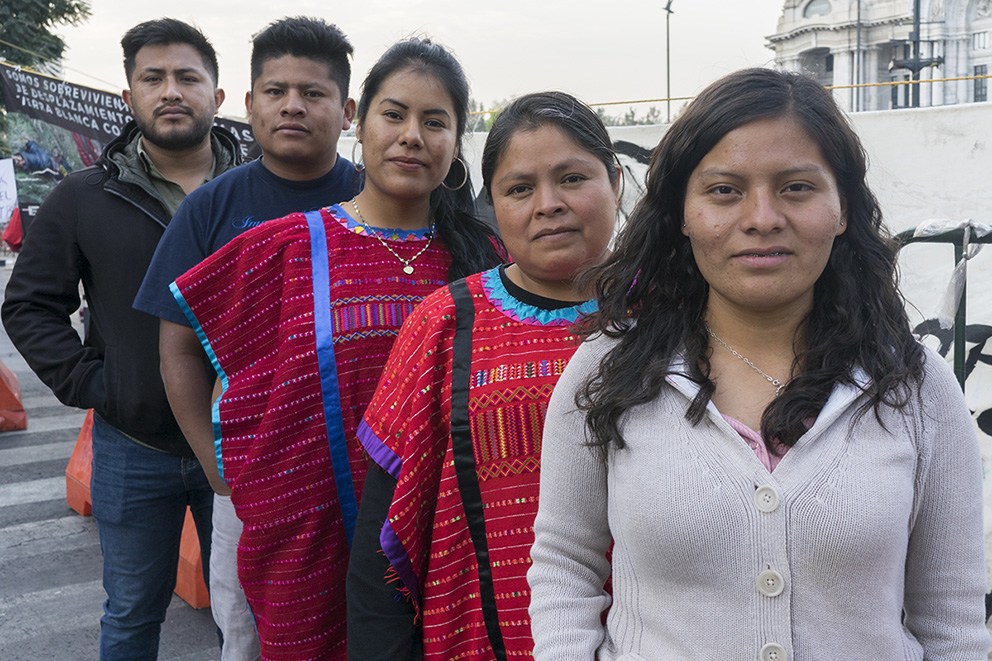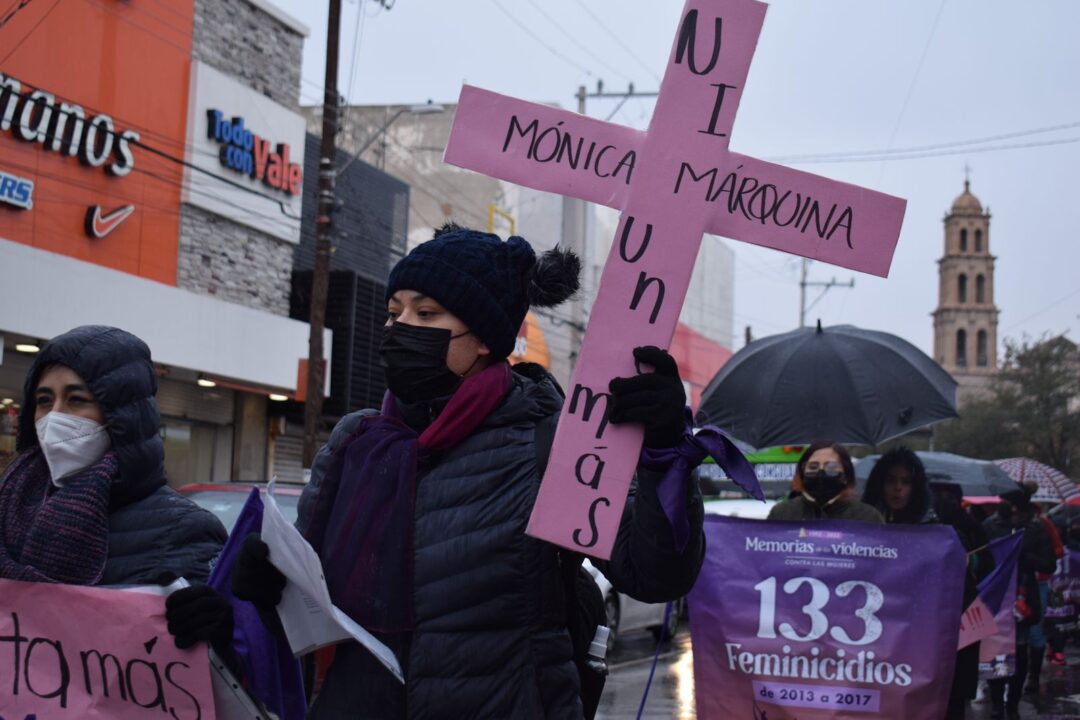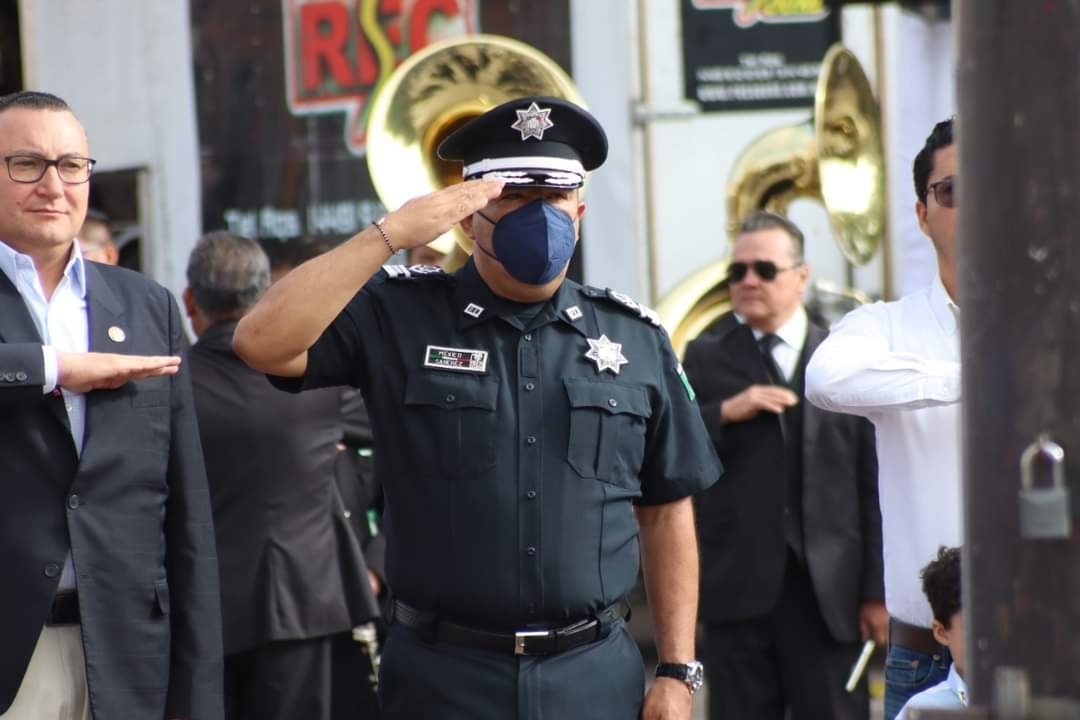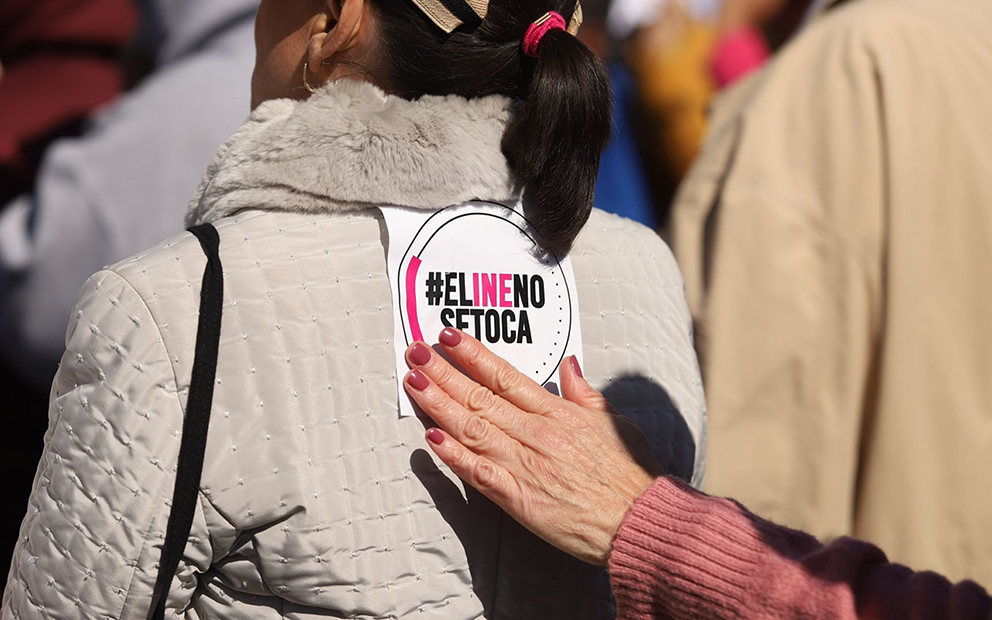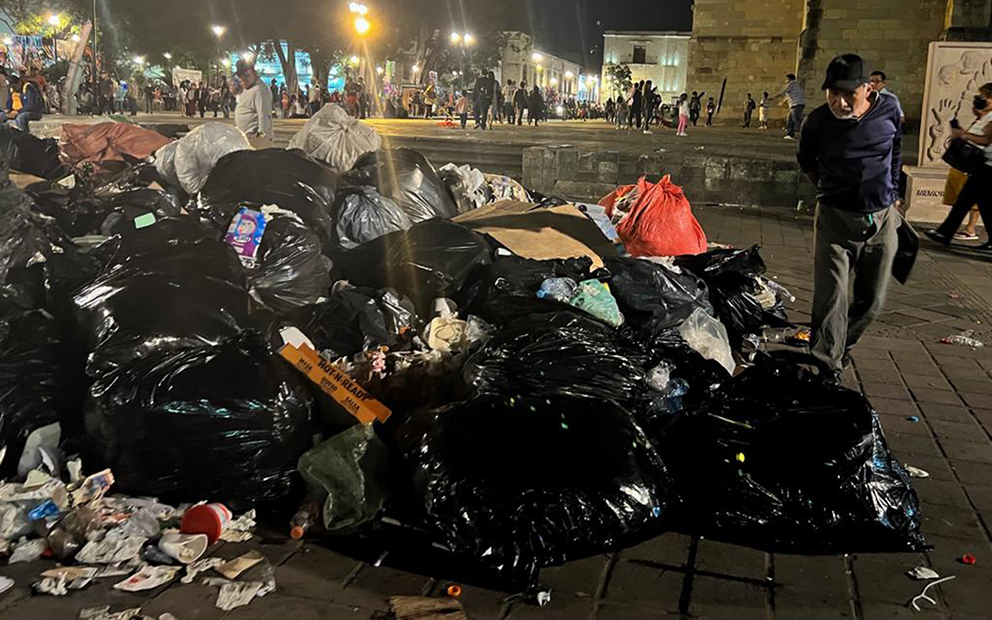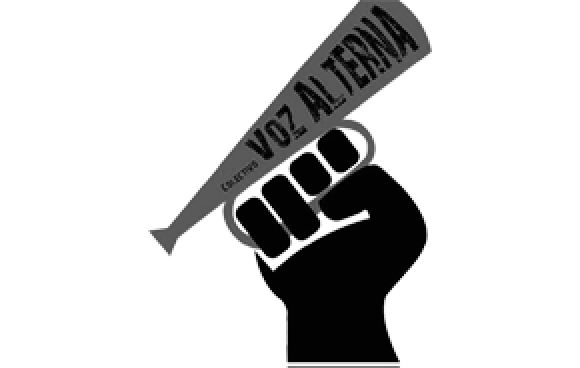Triqui families of Tierra Blanca Copala who were victims of forced displacement have put their lives on hold to learn how to live in an enormous city. They shut down roads, shout chants, and resist rejection and prejudice
Text and Photos by Isabel Briseño, originally published January 22, 2022.
Translated by Elysse DaVega for Pie de Página in English.
MEXICO CITY– Three hundred and sixty-five days have passed since one of Oaxaca’s Triqui communities was stripped of the life that they knew. Days later, the families traveled to Mexico City. After a year of living on the street, how do they hold onto the hope of getting their land back? Where do they find the strength to keep waiting to be heard?
Since the violent displacement in their community, the lives of boys, girls, grandmothers, grandfathers, men and women from Tierra Blanca Copala have been put on hold. The kids’ childhoods have been interrupted, as they’ve stopped playing and going to school. Women no longer weave their red huipiles, and men no longer work the land to feed their families.
All of them have been obligated to learn new things: how to live in an enormous city, how to shut down roads to be heard and ignore judgment from a society that insults them, and memorize chants demanding justice (which seems to be nowhere on the horizon).
Due to the age of its main representatives, many say that it’s a movement led by young people. In reality, the youth have assumed this role because they can speak Spanish; many older Triqui cannot. Even though they aren’t experienced in social movements, they’ve led a tireless fight for the return of the land, justice, and their freedom.
The following are some of their thoughts and feelings after putting their lives on hold for an entire year to live in an encampment in Mexico City.
«What else can we do to be heard?»
Bella, 28 years old
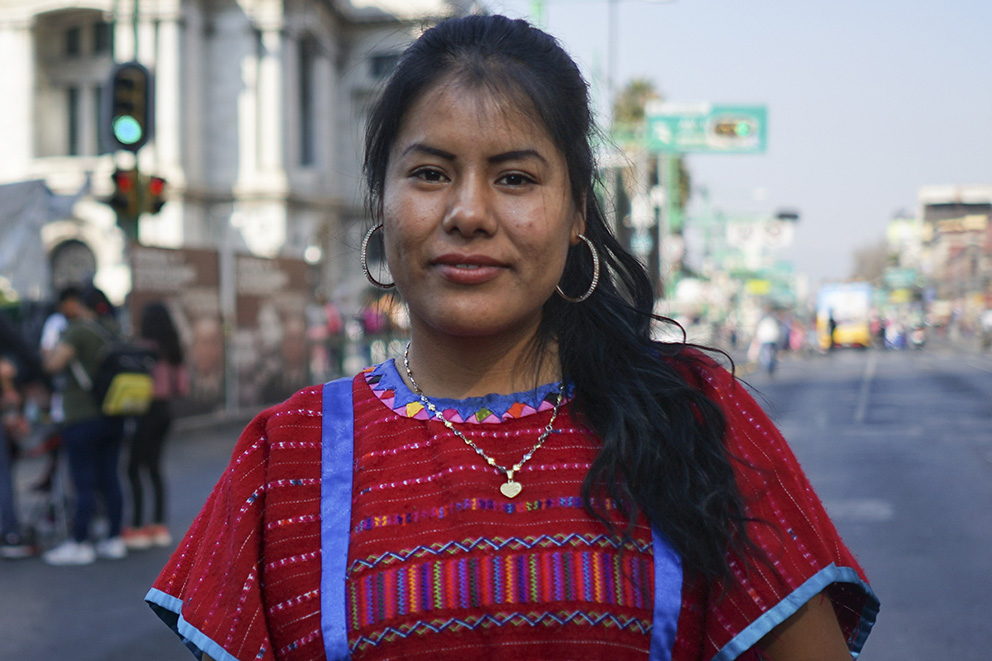
Bella is an Indigenous woman from Yosoyuxi, Oaxaca. She married a man from Tierra Blanca. In their community, the household and family is established in the husband’s place of birth. Like many Triqui women, she wants her land to be returned; the home that she spent years building alongside her husband is her only asset. Her sister, brother-in-law and their children are also displaced.
—How do you feel after a year?
«I feel like I’m up in the air, wandering aimlessly,» she answered immediately.
The brown-skinned young woman dressed in her beautiful huipil knows that there’s an enormous weight on her back. People trust in her just like in the rest of the Triqui representatives; they give them strength.
—What’s the biggest issue you’ve dealt with in the past year?
«A lot of things, but the lack of support from my family for fear that something might happen to me has been the hardest. They tell us to give up because it’s too dangerous, and it’s true. We are taking risks. But if I give up, what kind of example would I set for my daughter? How could I leave my people like this? Either all of us go back, or all of us give up– either way, it has to be all of us.»
My mom and sisters ask me every day what I’ll do if something happens to me, what will happen to my daughter– but I’m not a bad person. I’m not fighting because I want something that’s not mine. That’s what gives me strength and hope.» She fondly recalls the words of her father, who told her that getting organized is the only possible way to defend and survive. «His words and advice are my only weapon, Bella says.
Aside from her desire to reclaim her home, Bella is anguished at the thought of the authorities, who have done practically nothing to resolve the issue.
«What more can we do to make them listen to us?» she asks herself nightly inside her tent set up on Avenida Juárez.
Where, and who? Who else can they run to if federal and state authorities have no desire to guarantee them a safe return?
«We help and take care of each other»
Gerardo, 29 years old
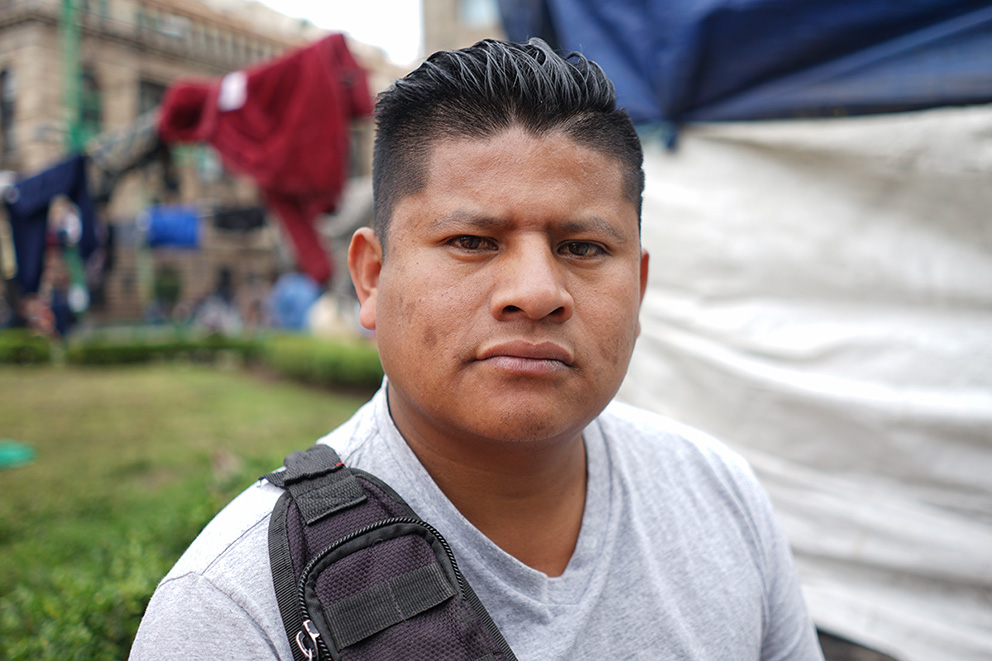
Chawi (who is also called Suplente), is of strong countenance. The children hug him when they greet him: «Chawi!» they say. That’s how they say «calm» on the isthmus of Oaxaca, he says. He’s always this way, calm and distanced, but alert.
He was born in Tierra Blanca. Before the displacement he was an auxiliary agent at the town hall– a position that didn’t save him from being displaced. Suplente says that his brother-in-law Andrés was killed and Andrés’ three children injured in an attack by the Triqui Unification Movement (MULT). This is why he’s participating in the sit-in, along with his two sisters and five nieces and nephews.
Being homeless is hard, but we have to keep going. We help and take care of each other. If someone loses heart or loses hope, we support each other.
Gerardo knows that trust in one another is very valuable. It’s the reason why he stands by his people. He says that they’ve learned a lot in the city, but they’ve also gone through a lot of sorrow.
—What kinds of things?
«We’ve had to learn to live on the streets. I have no answer when the kids ask me, «When are we going back?'»
«We hung our banners and we’re here to stay»
Isabel, 21 years old
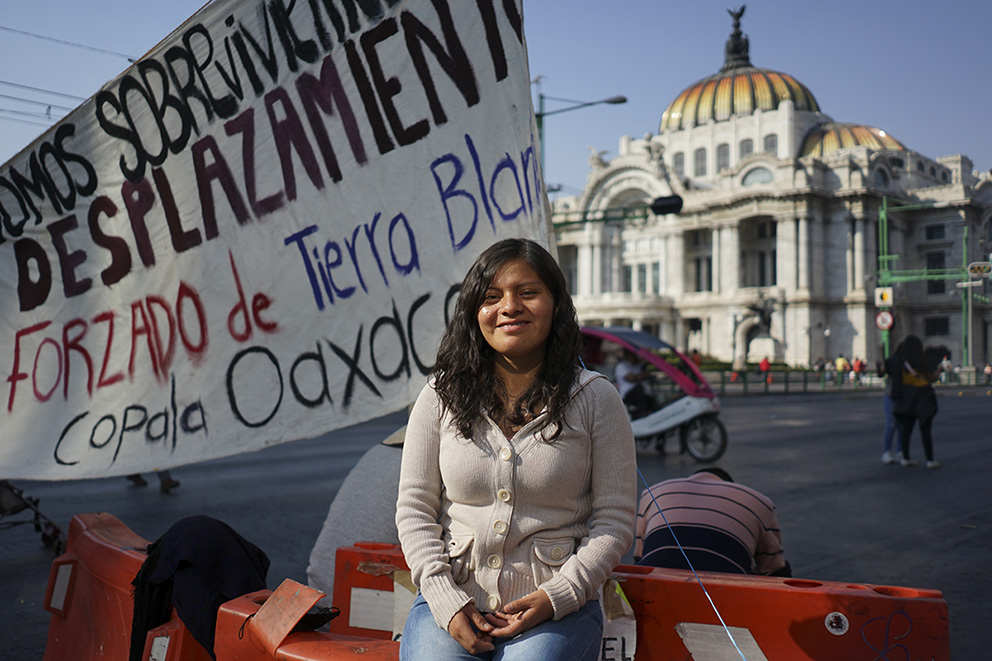
She was born in Yosoyuxi, Oaxaca, but she’s lived in Mexico City since the age of six. Her dad gave her the responsibility of maintaining her native language: Triqui. Isabel has chosen to fight– a path that her grandparents never wanted, not even for the men of the family.
Isabel’s not displaced herself, but she is Triqui. It hurts her to see injustices like these. The children at the encampment adore her. She helps coordinate performance actions by the women. She’s taught them everything that she’s learned: «You have to yell like this, you have to stand here so that the cars can’t pass… They say yes to everything, and they listen to me even though I’m only 21 years old. They help me help them,» said the young woman who’s slept, ate, and lived like them to understand what they’re going through.
—How did you join the encampment?
«It came out of nowhere. They (referring to the Triqui from Tierra Blanca) were looking for students in Mexico City to help them address a letter to the government to demand the freedom of women that had been kidnapped.»
The displaced families of Tierra Blanca arrived in Mexico City on January 22, 2021. Isabel went to their rally in front of Palacio Nacional to support them and denounce an issue still largely unknown to the public. Upon realizing no one would listen, they decided to mobilize on the Eje Central, one of México City’s key arteries. «We’ve hung up our banners and we’re here to stay.»
Those who had been displaced didn’t know who she was. They thanked her for her support, but they thought that she would leave within a few days. She didn’t. Instead, she decided to change her whole life. She was preparing to take college entry exams, but she stopped to join those that she now considers her family. She says she no longer thinks of herself; she thinks about her people.
They call me a revolutionary, but I’m not. To me, a revolutionary is something bigger. I think that word means something bigger than me. I’m hoping for a Triqui unification, for everyone from the region to come together.
She’s occasionally questioned her capacity to help them, but she stays with them. She believes that she won’t be able to go home in good conscience if they’re still in the street.
—How long do you think you’ll be here?
«If they can’t return to their land, I won’t have a life, either. I’ll be here until they can go back.»
«If a Triqui dies, it’s no big deal»
Horacio, 26 years old
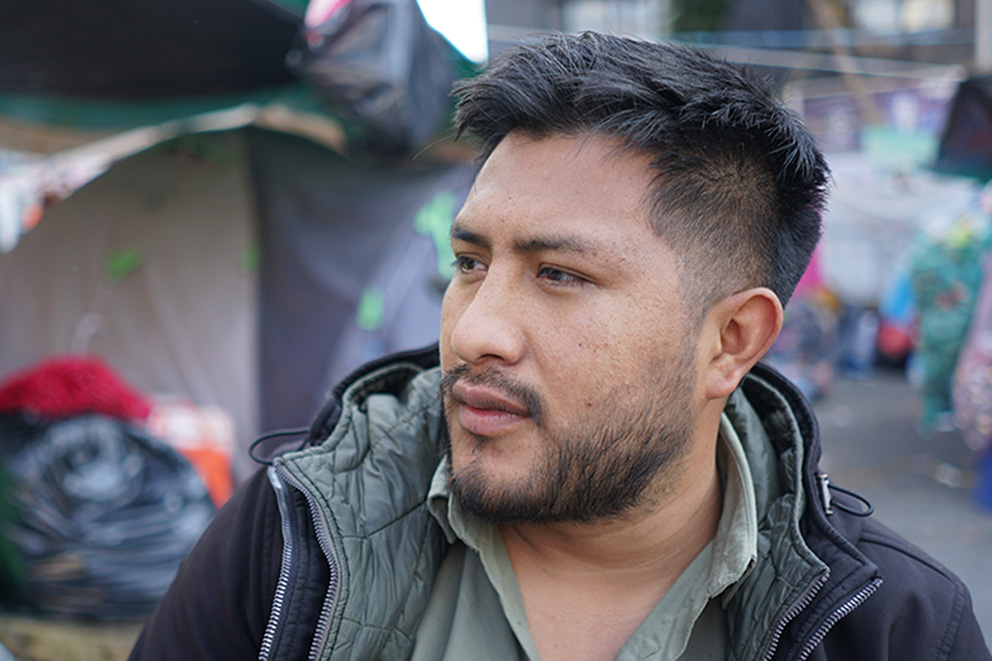
He had never taken part in activism before this. He’s not one of the displaced, but he’s one of their representatives. Along with Bella, Gerardo and Venus, he’s participated in talks they’ve held with the government. Those displaced aren’t his blood, but he considers them family. They share customs, a language, food and culture. His family, albeit from another region, is Triqui as well.
—How did you get here with them?
«I’m from Paraje Pérez, a neighboring community. When Andrés (Gerardo’s brother-in-law) was murdered, I found out, but I kept my distance. It was considered an internal affair at the time, so I just watched from the sidelines. But I acted on my beliefs when I saw MULT violating yet another community’s human rights, I realized that the story of San Juan Copala was repeating itself. I decided to respond to the call from the Independent Triqui Unification Movement (MULTI). With no prior experience I helped them with highway blockades, which, at that time, were carried out to demand the return of kidnapped women from Tierra Blanca.»
—You’re now one of the most visible representatives. Are you concerned for your safety?
«Opposing local powerbrokers puts us at risk of being jailed or killed, but I’ve come to terms with it. Injustice shouldn’t occur anywhere in the world. Where’s Child Services (DIF)? Where’s the National Institute for Women? We’re not seeing these institutions do their part.»
—How are you and the displaced continuing the sit-in if no one’s selling anything?
«[We receive] resources from compañeros in the United States. The people are here demanding the land be returned. They’re not asking for housing nor places to sell their wares, they just want to go home.»
—Why haven’t the government’s previous attempts to return the displaced worked out?
«The strategy is always the same. Alejandro Encinas and Alejandro Murat say that they’ll negotiate with MULT to ask for a return, that’s been going on for a year now. The government just keeps asking for permission. We still trust in these institutions, that’s why we keep working with them. But it’s important to mention that if we go on like this, eventually it’ll be four, five or six displaced communities, not just three. Tierra Blanca has to be the last, and the state must put a stop to it. If they don’t, they’ll be leaving the freedom of Oaxaca’s Indigenous communities in this group’s hands.»
—How are things looking for you in the new year?
«Complicated. Although there’s talks of change and conversations with the government, it seems that we’re in the same exact place as last year. López Obrador’s administration continues to normalize violence. The people at MULT have built a strategy based on lies. The State knows very well that their organization has gained power from violent, criminal acts, but they continue to tolerate them. The lack of justice is what brings about social crises and inequality, aside from violence, which is on the rise as well. If a Triqui dies, it’s no big deal.»
“I don’t understand why we’re still here”
Venustiana, 38 years old
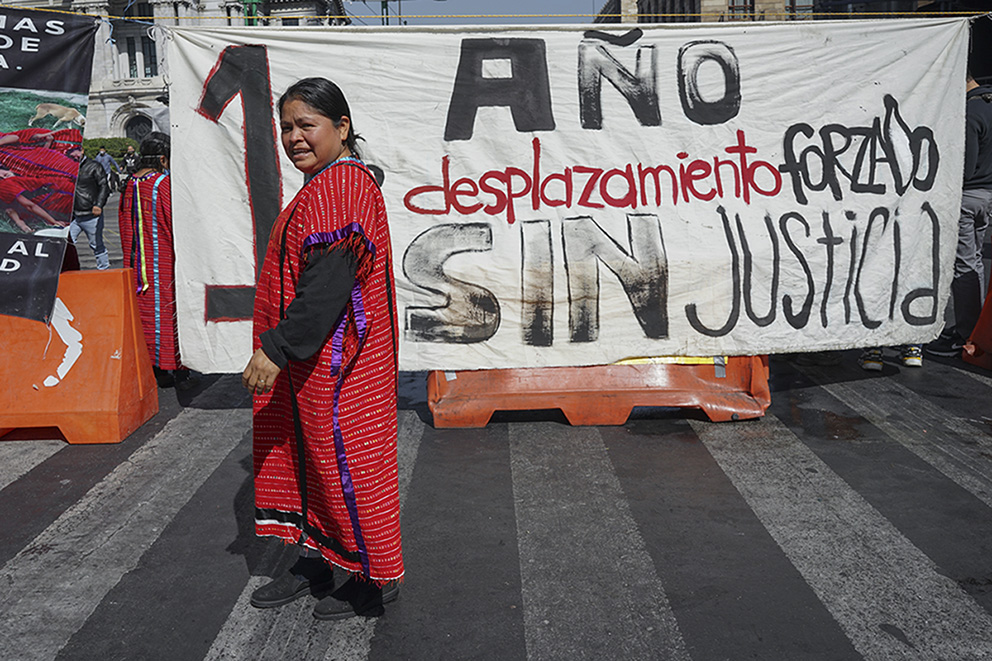
Venustiana is older than her fellow protesters. She was born in Tierra Blanca and was one of the women kidnapped and held by MULT for five days. She’s a preschool teacher, and she’s become a community representative due to her ability to speak Spanish. Her four kids, parents, brother, sister, and nieces and nephews are also part of the encampment.
She discussed how difficult it’s been for her to go from being a teacher to being representative in meetings with authorities.
«We’re all different, and I thought, ‘They (her fellow protesters) are the ones who know. It’s really hard for me. I want this now, but I know that everything comes in its due time. It’s slow, and it’s been hard for me to understand that. I see my family sleeping in the street and I get mad. I cry, and I don’t understand why we’re still here.»
—What responsibilities do you feel here?
«I feel an emotional and financial responsibility. My husband doesn’t want me to be here, he wants me to go to the U.S. with him. I feel I’m also failing as a teacher because I can’t teach a class when all I can think about is returning home and what we have to do to get there.»
—[The authorities] haven’t offered education for the kids?
«We’ve been here for a year and the National Council for Educational Development (CONAFE) has only just approached us about sending our children to school. But since they’re already a year behind, it doesn’t solve anything.»
—What do the other women say to you?
«They ask me, ‘Teacher, do you think we’re going to be able to go back?’ I encourage them and say that it’ll take time, but that’s not the response they want. Every time we have meetings with the government, they’re hoping for a solution.»
—How have you felt when an attempt to return has failed?
«Terrible! I feel embarrassed in front of everyone. It frustrates me to think that what we’re doing isn’t working. I think about why, and for how much longer.»
—Do you still have hope?
«Yes, I think we can do it if we work together.»
—You encourage others, but who encourages you?
«Myself.»
Isabel Briceño has never liked it when happy stories end, which is why she preserves them with her camara, and the painful stories she captures to help seek resolution.
Click here to sign up for Pie de Página’s bi-weekly English newsletter.
Ayúdanos a sostener un periodismo ético y responsable, que sirva para construir mejores sociedades. Patrocina una historia y forma parte de nuestra comunidad.
Dona

